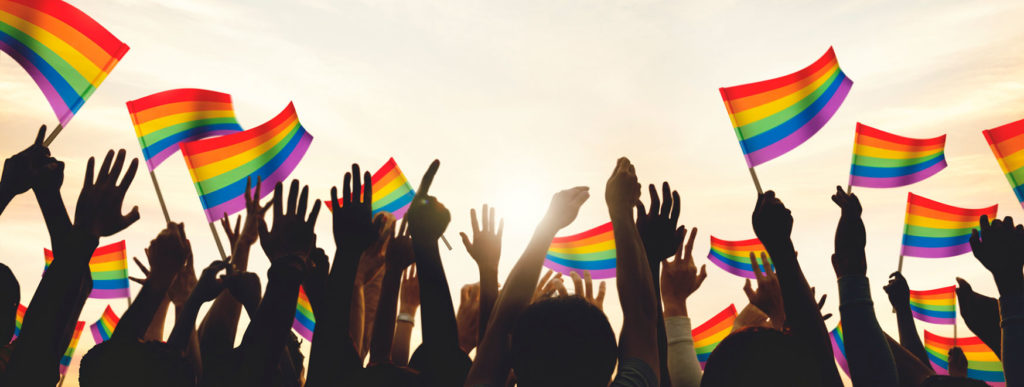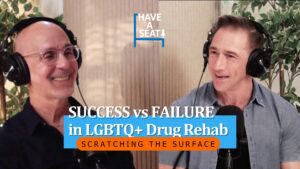There is much to consider when choosing a treatment program for substance abuse and addiction, but one of the most important aspects of this process is to make sure the facility of your choice takes all your needs, even those that don’t specifically focus on your addiction, into account. This can mean anything from helping you learn to cope with psychological disorders to respecting your culture, religion, or ethnicity. It can also include your sexuality and/or gender, which is why finding an LGBTQ-affirmative program is important to a safe recovery.
1. LGBTQ-identifying People Need Specialized Care.
If you identify as LGBTQ, you will often require some sort of specialized treatment for addiction (National Institute on Drug Abuse). For example, people in the LGBTQ community who have addictions are more likely to have a secondary diagnosis in addition to their substance use disorders. Co-occurring disorders, in general, require care by qualified professionals, and facilities that specifically work with LGBTQ individuals should also be versed on presenting problems that are unique to this population.
2. LGBTQ People Have a Higher Rate of Substance Abuse.
 A recent study by the National Survey on Drug Use and Health found that people who identify as “sexual minorities” or those in the LGBTQ community have a higher rate of substance abuse and addiction, just like they have a higher rate of psychological disorders. This intensifies the need in this community, not only for treatment, but for care that takes one’s sexuality and/or gender into account, care that focuses on helping people who are both LGBTQ and addicted individuals. An LGBTQ-specific program can offer this.
A recent study by the National Survey on Drug Use and Health found that people who identify as “sexual minorities” or those in the LGBTQ community have a higher rate of substance abuse and addiction, just like they have a higher rate of psychological disorders. This intensifies the need in this community, not only for treatment, but for care that takes one’s sexuality and/or gender into account, care that focuses on helping people who are both LGBTQ and addicted individuals. An LGBTQ-specific program can offer this.
3. LGBTQ People Often Need Trauma-Informed Care.
People who identify as a sexuality other than straight or as a non-cis gender have a higher rate of experiencing trauma and violence throughout their lives. These trauma rates can be higher in certain populations within the LGBTQ community, especially for trans women of color (Office for Victims of Crime). Trauma-informed care is a specific type of addiction treatment that focuses on helping a person work through their experiences and avoiding further traumatization, a type of care that is easier to find at LGBTQ-affirmative programs.
4. Patients Can Be Near Others with Similar Experiences.
If you choose an LGBTQ-affirmative program, you will be around other people who have experienced many of the same things you have, people who belong to the same community you do. This not only makes being in treatment easier for many individuals, but it can promote healing, especially since it strengthens the sense of safety patients receive in their treatment programs.
5. These Programs See Patients as Individuals.
The LGBTQ community is vast and nuanced; not everyone who fits under this umbrella is the same, has had the same experiences, or needs the same treatment. Facilities that offer LGBTQ-affirmative care are more likely to treat patients as individuals because of this fact, rather than giving everyone a one-size-fits-all treatment program. Individualized treatment is often the cornerstone of a strong recovery.
6. LGBTQ Programs Offer Additional Options.
Often, these programs offer more than just evidence-based treatments like medication and behavioral therapy. In addition, they may offer group sessions where patients can talk about issues like discrimination, coming out, identity, and other important topics to the LGBTQ community. These programs may also provide options like holistic treatments, nutrition and smoking cessation classes, and others. After all, these programs should be focused on going beyond basic addiction treatment and truly helping people recover mind, body, and soul.
7. LGBTQ Programs Are Judgement-free.
 Many people who define themselves as gay, lesbian, trans, bisexual, queer, or have a non-conforming gender struggle with judgment: at home, at work, from friends, and from society. This almost always creates isolation can sometimes lead to substance abuse. At a treatment center like La Fuente Hollywood Treatment Center that offers LGBTQ-affirmative care, you will be able to find a space that does not judge people and allows patients to be themselves. Simply put, it is a space to recover from drug abuse and to begin to feel like you again, no matter who you are. [kkstarratings]
Many people who define themselves as gay, lesbian, trans, bisexual, queer, or have a non-conforming gender struggle with judgment: at home, at work, from friends, and from society. This almost always creates isolation can sometimes lead to substance abuse. At a treatment center like La Fuente Hollywood Treatment Center that offers LGBTQ-affirmative care, you will be able to find a space that does not judge people and allows patients to be themselves. Simply put, it is a space to recover from drug abuse and to begin to feel like you again, no matter who you are. [kkstarratings]




